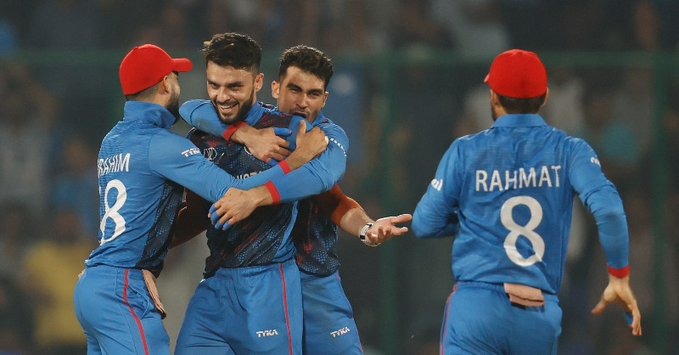
Any fair-minded observer would tell you that this is a World Cup only in name. The day it was reduced to a ten-team round-robin event meant to maximise the number of India matches, it became a made-for-television event. The ‘World’ slipped quietly out. And while Afghanistan and the Netherlands are in India to represent cricket’s have-nots, the reality is that we hadn’t even come close to a genuine upset in more than 10 days. Those who say that New Zealand beating England was one ignore the fact that England have been good for just one World Cup, while New Zealand have been cricket’s outstanding over-achievers for as long as most can remember.
Teams like Afghanistan have become used to condescension and being damned with faint praise. Before this tournament began, they had played eight ODIs against the ‘big three’ of India, England and Australia. If Sri Lanka improved so dramatically in the decade before winning the World Cup in 1996 – Courtney Walsh took 5-1 against them in Sharjah in 1986, as they were skittled for 55 – it was primarily because they got plenty of opportunities to play against stronger sides. Afghanistan’s role before arriving for this tournament was as the plucky underdog. How could they be anything else when they can’t pit themselves against the better teams?
But professional athletes are proud people and don’t like being stereotyped in such ways. You could see from the manner in which Rahmanullah Gurbaz set about his innings that he was done with the metaphorical and condescending pats on the head for turning up. Gurbaz was in Delhi to play and to show that he could take on the might of the defending champions as an equal.
He took a shine to Chris Woakes early on, slapping one over midwicket, and even Reese Topley, who had destroyed Bangladesh in his opening spell, wasn’t spared. Sam Curran, man of the tournament at the last T20 World Cup, found himself taken for 4-4-6, with the maximum landing deep in the stand at midwicket. Adil Rashid and Mark Wood, deftly hoisted over the third man for six, also felt the full force of Gurbaz’s withering blade. It’s not unfair to say that a run-out looked likely to be England’s only salvation, such as the hitting clinic Gurbaz put on.
His rage on being dismissed was a sign that today was a day when those hated words – ‘Well played, but…’ – would not be acceptable. And that mongrel spirit was in evidence right through the innings, even after a collapse that saw the brilliant start squandered. Rashid Khan and Mujeeb U Rahman gave sterling support to the other batting hero, Ikram Alikhil, who rode his luck to finish with 58 off 66 balls. Instead of folding for under 250, as looked likely at 190-6, Afghanistan added nearly 100 more.
It was not much more than they had scored against India, a total that Rohit Sharma and crew overhauled with ridiculous ease. But this was a vastly different surface from that featherbed. That had become apparent when Rashid took 3-42. As soon as Hashmatullah Shahidi opened the bowling with Mujeeb, it was clear that Afghanistan had spotted a 22-yard strip that played right to their spin-bowling strengths.
Rashid Khan, their talisman, was tidy but took just the wickets of Liam Livingstone and Rashid before closing it with Mark Wood. It was Mohammad Nabi, whose six-hitting in a game against the Marylebone Cricket Club (MCC) at the Police Gymkhana in Mumbai nearly 18 years ago played such a big part in Afghanistan being accepted into cricket’s big tent, that was just magnificent in both subduing the scoring and taking wickets. The wicket of the in-form Dawid Malan really put the pressure on, and he would return later to snaffle Curran as well.
But the star of the show was undoubtedly Mujeeb. Indifferent bounce and sharp turn did for Joe Root, and it was the wicket of Harry Brook – caught behind in his penultimate over – that really killed off any lingering English hopes. Others chipped in too. Fazalhaq Farooqi trapped Jonny Bairstow in front, and Naveen-ul-Haq got dramatic inward movement to castle Jos Buttler.
For a nation that has endured a horrific earthquake in Herat that killed thousands and left so many more homeless ahead of a harsh winter, this will only be a temporary balm. But as far as this tournament is concerned, there’s no overstating the importance of this result. No World Cup in any sport is ever complete without a giant-killing. Saudi Arabia were the only side to subdue Lionel Messi and Argentina in Qatar last year. It’s such results and the element of jeopardy they introduce that make global events worth watching.
The Zimbabwe cricket story began with Duncan Fletcher’s all-round heroics upsetting Australia in 1983. Kenya’s highlights included a victory against mighty West Indies and the fighting Irish saw off Pakistan, England and West Indies in consecutive World Cups between 2007 and 2015. Bangladesh were promoted to the top table largely because it beat Pakistan in 1999, and it justified its place in such a company by pushing India off the plank and into the Caribbean Sea in 2007.
These are the games you never forget, the I-was-there moments that you never tire of talking about. A day after an utterly one-sided game between India and Pakistan, Afghanistan gave the 2023 World Cup the adrenaline shot it needed. The World Cup may be designed for the so-called Goliaths – Australia, incidentally, now sits bottom of the points table – but try saying that to the Davids. As long as there’s a slingshot handy, they’ll continue to believe. And that, in a nutshell, is the beauty of sport.




